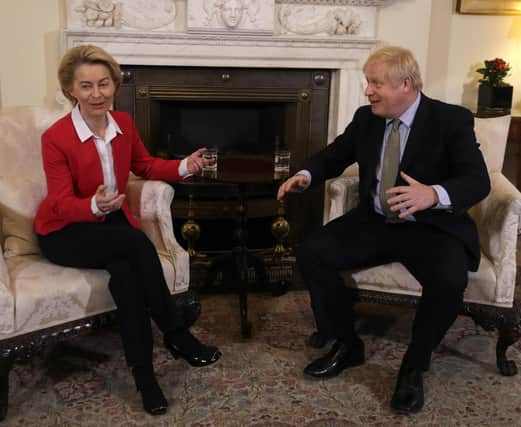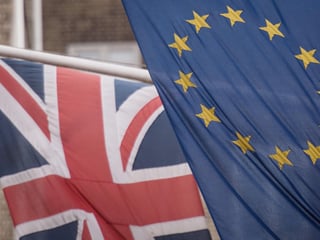Boris Johnson to visit Brussels for face-to-face Brexit talks as negotiations remain deadlocked


Britain and the EU have so far been unable to reach a Brexit trade deal agreement with "significant differences" between the two sides, but the Prime Minister’s visit will now raise hopes of the prospect of a breakthrough.
Following a phone call with European Commission president Ursula von der Leyen on Monday, the pair issued a joint statement where they confirmed a showdown in Brussels this week.
Advertisement
Hide AdAdvertisement
Hide AdThe statement read: “As agreed on Saturday, we took stock today of the ongoing negotiations.
"We agreed that the conditions for finalising an agreement are not there due to the remaining significant differences on three critical issues: level playing field, governance and fisheries.
“We asked our chief negotiators and their teams to prepare an overview of the remaining differences to be discussed in a physical meeting in Brussels in the coming days.”
Despite the meeting, a senior UK Government source insisted there had been no change in the talks since Friday.
They said: “We have made no tangible progress. It’s clear this must now continue politically.
"Whilst we do not consider this process to be closed, things are looking very tricky and there’s every chance we are not going to get there.”
The PM is now expected to hold the crunch meeting on Wednesday, the same day the EU’s chief negotiator Michel Barnier set as the new deadline for the Brexit negotiations.
During briefings to MEPs and EU ambassadors in Brussels, Mr Barnier said the talks were "not far from the very end game", but sources suggest an agreement is still far from guaranteed.
Advertisement
Hide AdAdvertisement
Hide AdSpeaking after the meeting announcement, Labour’s shadow minister for the Cabinet Office Rachel Reeves stressed securing a deal was “critical”.
She said: “Day after day we see this government failing to deliver their promises to the British people and failing to get the deal they promised done.
“Securing a deal is critical to the British national interest for jobs and security.
"Even at this 11th hour, we urge both sides to get on with reaching an agreement.
"We can then focus on the job at hand, which is securing the economy and rebuilding our country from the pandemic.”
Paymaster General Penny Mordaunt explained the level playing field remained the "most difficult" issue preventing a deal.
Speaking in the Commons on Monday, Ms Mordaunt suggested the delay allowed the UK side to assess what constituted a good deal.
She explained: “This opportunity also affords us in this place to show our collective resolve in getting a good deal and our expectations of what that needs to look like and what we will not accept.
Advertisement
Hide AdAdvertisement
Hide Ad“Whilst there has been some progress across many areas, familiar differences remain on the so-called level playing field, fisheries and governance.
“Of these, the level playing field issue is currently the most difficult."
It came on the same day the UK Government revealed it was willing to remove the controversial Internal Market Bill clauses if there is a Brexit deal.
The government explained the clauses that had infuriated both the EU and Scotland would be dropped if the “solutions being considered” in the negotiations were agreed.
In a statement from the Prime Minister’s office, the government said: "The UK and the EU have worked constructively together through the Withdrawal Agreement Joint Committee.
“Discussions continue to progress and final decisions are expected in the coming days.
“If the solutions being considered in those discussions are agreed, the UK Government would be prepared to remove clause 44 of the UK Internal Market Bill, concerning export declarations.
“The UK Government would also be prepared to deactivate clauses 45 and 47, concerning state aid, such that they could be used only when consistent with the United Kingdom’s rights and obligations under international law.”
Advertisement
Hide AdAdvertisement
Hide AdThe Internal Market Bill had already been rejected by the governments of Scotland, Wales and Northern Ireland, which claim it “rides roughshod” over devolution.
The Bill has also been roundly criticised for breaking international law, although the UK Government has insisted it is both good for Scotland and legally sound.
The PM’s office insisted on Monday: “The UK Government is committed to the full implementation of the Northern Ireland Protocol in a pragmatic, proportionate way which recognises Northern Ireland’s place in the UK’s customs territory, and upholds the Belfast (Good Friday) Agreement in all its dimensions.”
The Bill returned to the Commons today after the House of Lords removed clauses that allowed ministers to ignore the Withdrawal Agreement.
MPs will now be asked to re-insert the powers, with a vote later tonight.
Despite the willingness to drop the clauses, the SNP accused the UK Government of a “shameful behaviour”.
SNP Westminster leader Ian Blackford MP said: "This 'give-us-a-deal-or-else' tactic is nothing short of shameful and serves as yet another reminder of the extreme Brexit the Tories are pursuing.
"The fact remains that the UK Government is still intent on reversing Lords' amendments and reinserting the law-breaking clauses back into the Bill - underlining the true motives of this deeply damaging Bill.
Advertisement
Hide AdAdvertisement
Hide Ad"The Tories' move to also ignore the Lords' bid to remove devolution power grab clauses, yet again highlights the threat to Scotland and the devolved Parliaments.
"The Bill should be scrapped. It is nothing short of a power grab piece of legislation that will deliver the biggest attack on devolution since the Scottish Parliament reconvened, override the democratic decisions of devolved Parliaments, and impose standards over devolved areas.”
If you haven't already, please consider supporting our trusted, fact-checked journalism by taking out a digital subscription.
Comments
Want to join the conversation? Please or to comment on this article.
